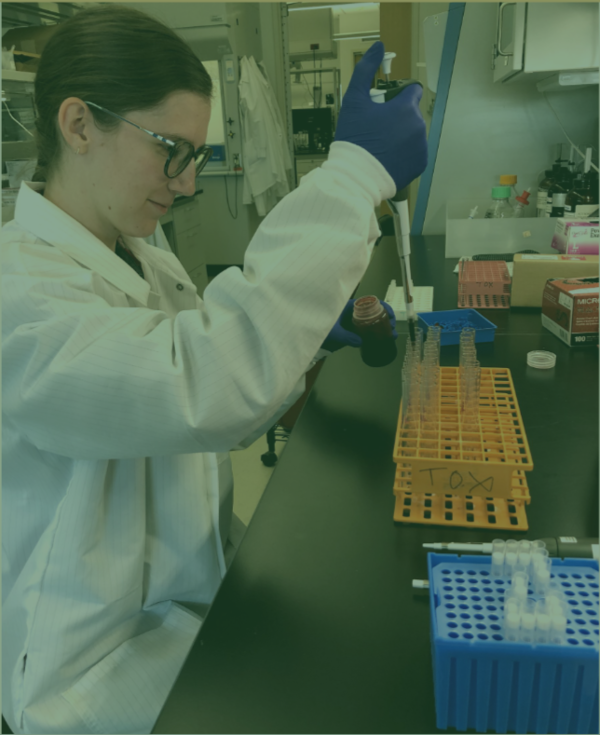
3
Options

5
Semesters
Once students matriculate into the BS program, the average time for students is 5 full-time semesters. Any students preparing for matriculation will need to complete all pre-requisite coursework, which takes an average time of 6-8 additional semesters (fall, spring, or summer).

142
Graduates
| Number of graduates by year | ||
|---|---|---|
| Academic Year | # of Graduates | |
| 2023-2024 | 34 graduates | |
| 2022-2023 | 40 graduates | |
| 2021-2022 | 25 graduates | |
| 2020-2021 | 17 graduates | |
| 2019-2020 | 14 graduates | |
| 2018-2019 | 12 graduates | |

44%
Employment/Advanced Degree Rates
| Post Graduation Information | |||
|---|---|---|---|
| Graduation Year | # of Graduates Employed | # of Graduates entering into Advanced Degree | # of Graduates with no response/unreachable |
| 2023-2024 | 13 | 1 | 20 |
| 2022-2023 | 12 | 3 | 25 |
| 2021-2022 | 11 | 4 | 10 |
| Post graduation information is only available for the past 3 years. | |||

76%
Retention
| All Student Retention Rates | ||
|---|---|---|
| Cohort Year | # of Students in Cohort | Retention Rate |
| 2023-2024* | 25 | 100% |
| 2022-2023 | 5** | 100%** |
| 2021-2022 | 82 | 73% |
| 2020-2021 | 73 | 52% |
| 2019-2020 | 62 | 74% |
| 2018-2019 | 54 | 56% |
|
*Matriculation process began in 2023. These figures reflect only the matriculated students. **During 2022-2023 academic year, due to the upcoming implementation of the matriculation process, students were not allowed to enter into the BS program. Therefore the figures for this academic year are not reflected accurately. |
||

49
Last Academic Year Student Capstone Completions
| Student Capstone Information | |||
|---|---|---|---|
| Academic Year |
Internships (# of students) |
Research Projects |
Capstone Titles (# of students) |
| 2023-2024 |
American Fork Police Department (6) Detroit Public Safety Headquarters (1) Salt Lake City PD Crime Laboratory (3) Saratoga Springs Police Department (1) The Sherry Black Foundation (3) Unified Police Department (1) Utah Cold Case Coalition (4) Utah County Sheriff's Office Forensic Laboratory (3) Utah Office of the Medical Examiner (1) |
Drip Stain Patterns: How They are Affected by Different Fabric Blends Ethnobotanical Link between Tropane Alkaloids and Datura The Effect Different Tools and Metals Have on the Restoration of Firearm Serial Numbers Toolmark Impressions Comparisons |
University of Tennesse Forensic Anthropology Center Experience (12) Utah County Sheriff's Office Forensic Evidence Management Project (10) |
| 2022-2023 |
American Fork Police Department (1) Berg Mortuary (3) Fausett Mortuary (1) Salt Lake City PD Crime Laboratory (3) The Refuge Utah (1) Utah County Sheriff's Office Forensic Laboratory (2) Utah Office of the Medical Examiner (1) Utah State Toxciology Laboratory (3) West Jordan Police Department (1) |
Cast-off and Impact Pattern Distinction Chemical Reagent Effectiveness in Serial Number Restoration Class Characteristics of Tool Marks and the Identification of Tool Makes and Models Fingerprint Data Recovery for the Program known as BECKIE How Amount of Force and Surface Type Alter Medium Velocity Spatter Appearance |
University of Tennesse Forensic Anthropology Center Experience (12) Utah County Sheriff's Office Forensic Evidence Management Project (10) |
| 2021-2022 |
American Fork Police Department (3) Draper Police Department (1) Salem Police Department (1) Salt Lake City PD Crime Laboratory (1) Saratoga Springs Police Department (1) South Jordan Police Department (1) Utah Cold Case Coalition (3) Utah County Sheriff's Office Forensic Laboratory (4) Utah Office of the Medical Examiner (5) |
University of Tennesse Forensic Anthropology Center Experience (12) | |

The Bachelor of Science in Forensic Science – Laboratory and Forensic Investigation degrees are accredited by the Forensic Science Education Programs Accreditation Commission.
Accreditation is an important aspect of our educational programs, as it demonstrates that we have met established qualifications and standards set forth by the FEPAC accrediting body. FEPAC’s mission is to maintain and to enhance the quality of forensic science education through a formal evaluation and promotes academic quality of college-level academic programs.
In 2022, UVU’s Forensic Investigation degree program was the first of only two universities in the entire nation to receive FEPAC accreditation of a Crime Scene Investigation concentration
Utah Valley University is accredited by Northwest Commission on Colleges and Universities, 8060 165th Avenue, Suite 100 Redmond, Washington 98052-3981 (425)558-4224. Click HERE for further information on this accreditation.